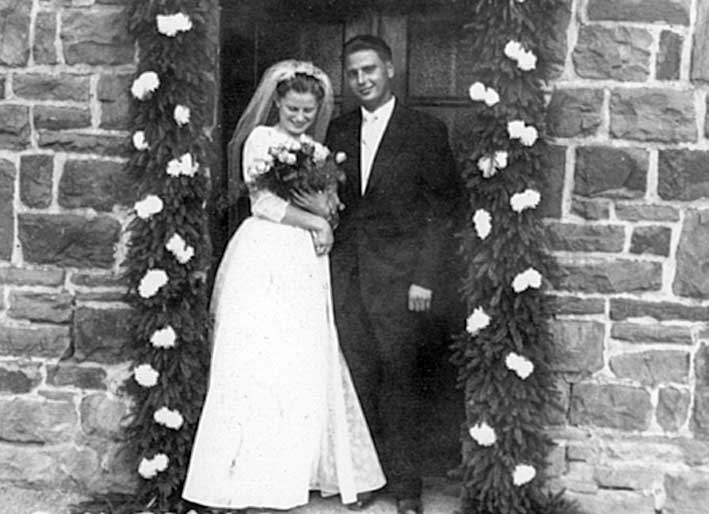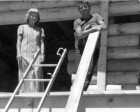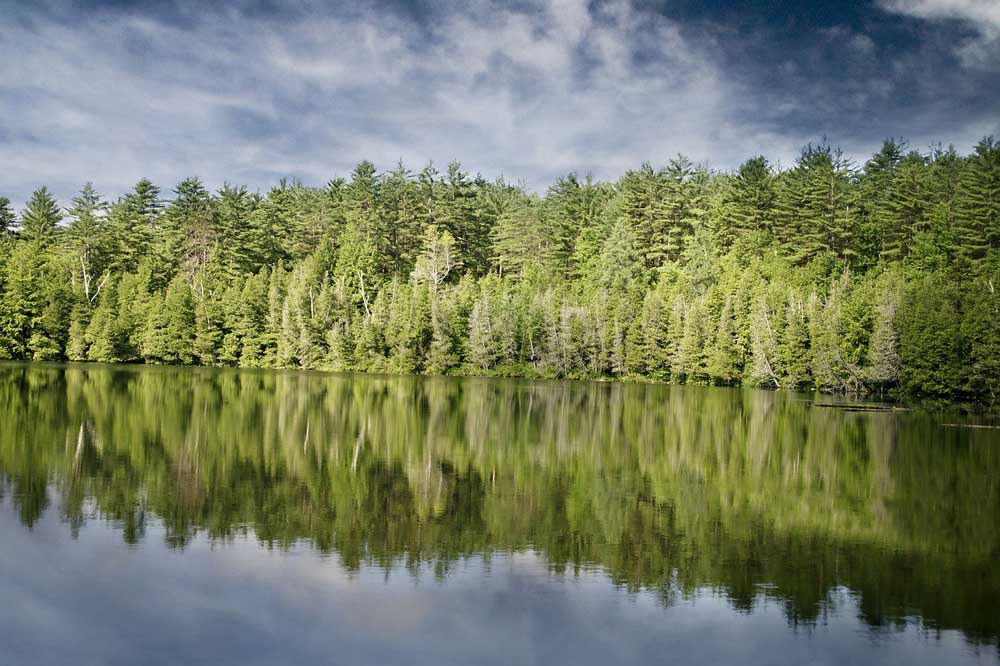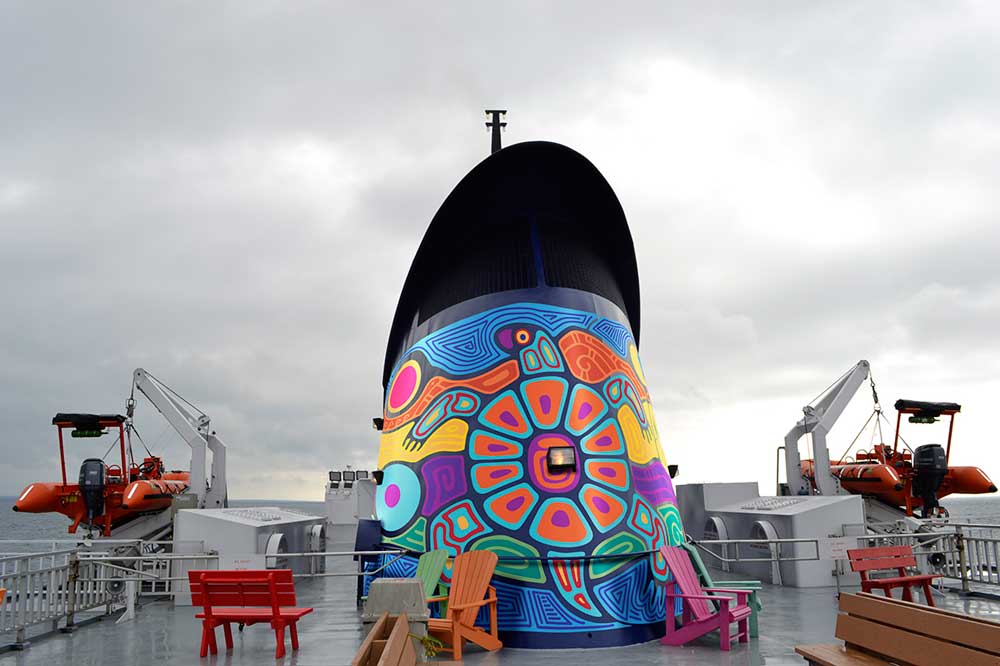Ursula and Oskar Hettmann were in their 30s when they left their native Germany for Canada. Much of their adult life has been spent on Manitoulin: Oskar as a forester working between Manitoulin and Germany and Ursula as an artist, creating amazing, unique pieces of jewellery, popular for its originality and excellent workmanship. She sells her creations in many Island locations including a craft shop beside her home where eye-catching clothing of her own design is also available. The couple lives in an idyllic setting, in a new, circular domicile, naturally of their own design overlooking Lake Huron. Their home sits within a tree-lined panorama, complete with a multitude of deer feeding on the hay and grain supplied daily by Oskar.
Ursula, ‘Uschi,’ was born in a little town called ‘Guten Tag’ (translated ‘Good Day’) on August 11, 1938 to Otto and Elsbeth Land. “I was the first child in town to be born in a home fitted out with electricity. It is located in a small rural area outside of Schlesien in Eastern Germany.” Her siblings are Dieter, Dorthea, Eva and younger brother Georg. “One of my first memories was being fearful of the huge dog on my way to Kindergarten. Although the dog never actually hurt me, that walk to school seemed long and fraught with danger. When I came back to the area as an adult, I was amazed at how much that distance had shrunk and of course the dog was gone.”
“Before the war, I used to ride on our horse-pulled wagon, feeling safe beside my father. These little trips with him were special. He left for the war when I was six and my mother had to run the farm by herself. We all helped with the big garden and I was happily assigned to look after my little brother Georg.”
During the war, wounded German officers were sent to local farms for rehabilitation. “We would care and cook for them even though most civilians were going through hard times themselves. By the time we heard the sounds of war moving closer in 1945, we knew it was time to leave. All citizens were asked to leave their possessions behind for the soldiers to use. We took only the deeds to the farm, our family ledger and some clothes.” The Land family stayed with relatives in Bunzlau and then kept moving west with the war at their heels.
“Once our father was nearby and he helped us pack the wagons before we left again. He went back for one last check. Apparently, I was curled up on a mattress, fast asleep, and nearly forgotten!” The family took the train to the Dresden area and then rushed underground to a bomb shelter to avoid the aerial attack. “One night, still in Dresden, I saw all the incendiary bombs fill the sky. I stood in amazement at the spectacle of fireworks and uttered one word ‘hubsch’ (beautiful). My mother was so shocked by my response, she slapped me.”
In the last year of the war, many of Germany’s male youth, 15 and up, wound up in Hitler’s army. The girls of this age had to do one year of social work, helping mothers with families, including ours. “After the war, our mother wanted to get the last young ‘helper’ girl back to her home in Stendal. Ursula’s father knew his wife’s plan so made his way there after the war. The International Red Cross had comprehensive records of people’s locations. This information was invaluable for many years after the war. “Die Flucht” (the flight) had disrupted many normal German lives. The Red Cross knew where Otto’s family was; they were joyfully reunited and moved to a nearby farm.
The Land family worked for the farmer and slept in the barn. Ripening asparagus provided both work and nourishment. “Going back home was no longer possible; our community was part of Poland now. The Polish government had assembled all the farms into production units for the state. Communism had replaced individual ownership of the farms.”
The Lands found some available farm land in Stendal. “We had a happy life, growing fruits and vegetables and selling them in Stendal. Unfortunately this area was soon part of East Germany and Otto was asked to become part of the Democratic Republic, the German Communist Party at the time, but he refused. Threats of jail time forced us to leave for West Germany.”
“We took a few possessions and walked through water and wooded areas arriving at Hildesheim in the English sector of Germany. This city was a thousand years old and it had been burnt to the ground. We spent the next four years there and I started high school. Four years later we moved again; this time to the country where we all felt more comfortable.” At this point Ursula shared that her family had moved every four years until she herself was married.
Oskar was born on April 26, 1932 to Alfred and Margarette (nee Kastner) Hettmann in Niedeschlesien in the former East Germany, on good farmland. He would gain a younger sister Waltraut, two years younger. He recalls missing school occasionally to help the local farmers look for mushrooms. The location of a mushroom patch was a well-kept secret. Oskar too was quite young when the war broke out. “We were a community of 65 houses. All the young men had left; only old people and youth were left.”
Oskar attended school four km away in Wilhelmsthal. He was responsible for his sister Waltraut. Sometimes the two of them could hitch a ride home on the big sleighs carrying lumber out of the forest. “I wanted to be a forester when I grew up so I never studied English much in school; I didn’t think I would ever need it,” he observes, smiling. “Math, biology, chemistry and history had much more appeal for me.”
“In 1945, after the war, the Russians moved in but the officer assigned to our area had been there two years earlier and we knew him well. He was fair and friendly. In September, the Polish civilians returned and the Russians left. Then the war started for me in a personal way,” Oskar shares. “The Poles came with nothing and they wanted our homes so we were transported away by train, 30 people in each of 50 box cars normally used for animals and heading for an unknown destination. We wondered if we would arrive to another part of Germany or perhaps Siberia,” Oskar recalls.
Luckily, the Hettmann family came to a big farm in Northern Germany, 100 km southwest of Hanover. The farmer had no children and needed help. “About this time, we found out that our father had been both a Russian and a Polish prisoner. He and five friends managed to escape and came to the west, where the family was eventually reunited. Apparently some POWs in Siberia didn’t get home until after 1950.”
For the first year after the war, Oskar’s family lived in the city. They could not grow their own food. “We came from the east, had no family here, no cows, no crop, no food. In 1947 we got a ‘Forest House’ that sat on some farmland.” Their new lifestyle soon provided regular meals. When company came to the forest house, Oskar was dispatched to catch trout in the nearby stream. “I used worms as bait and soon had a bucket full of fish. They would be transferred to the bathtub with running water to keep them fresh.”
Postwar Germany saw a lot of growth during the rebuilding process. Bombed businesses retooled their production machinery, leading to a more competitive production process. Entrepreneurs could make money if they worked hard. A strong work ethic was born and role-modelled to younger siblings. This rebirth included social changes, too. Weddings, for example, were no longer arranged by families.
Oskar and Ursula met in 1955 when her older brother brought Oskar home one day to play cards. It seems he was impressed with her beauty and her nice legs. “This car has very good tires,” he reflects with a smile. Soon the visits were regular and a new friendship bloomed. “My parents were very strict. They did not let me go out by myself. We had to go with friends,” Ursula confirms. Oskar explains that there was another young man interested in Ursula and he was not happy with that. After a short while, Oskar went to Ursula’s parents and asked for her hand. The couple was married on August 8, 1957, three days before Ursula’s nineteenth birthday.
The honeymoon was a train trip to the Austrian Alps. “We did a lot of walking, getting to know each other as a married couple,” Ursula attests. “The innkeeper asked if she could stop calling me ‘Genadige Frau’ (madam) because, according to her, I looked too young for that role. I also remember feeling both embarrassed and nauseous from a local version of schnitzel, normally a traditional German dish.”
Within a few years, Oskar built a beautiful log home overlooking a scenic valley. They had a young daughter and were expecting their second child. They would have four children, two girls and two boys: Heike, Thore, Antje and Joerg. Ursula always wanted lots of babies. She liked the teaching role, guiding children to their full potential.
After Oskar finished his engineering and forestry at university, he set up his own business, buying lumber and running a sawmill in town. He had a contract to supply wood to a furniture company that built a lot of chairs. He also had time to indulge in his favourite hobby and accumulated many trophies from his hunting prowess.
After her children were in high school and more independent, Ursula got her Master’s Certificate in Home Economics and began to teach tennis at the local club. “I worked with the youth and their mothers, mostly on weekends. Luckily I also had the opportunity to learn jewellery crafting from a Goldsmith Meister (Master). Jewellery apprentices would gather at our home where I could both teach and learn.”
When their dream of living by the water became jaded by ‘over-crowding’ at their North Sea cottage, both began to look to consider moving to a new country. One day Oskar opened his German hunting magazine and found an interesting piece of land for sale in Canada. He showed it to Ursula and then decided to take a closer look himself on a weekend flight to Toronto. He rented a car and drove north to Manitoulin.
“There were four big 100 acre lots for sale but no roads right to the property, so the realtor and I hiked through the bush. I picked one lot with many trees and purchased it in 1971.” That summer, the whole family flew to Canada. First, they checked out a large mall in Toronto and were impressed with so many ‘inside’ stores; perhaps a sign they were in for cold winters. They rented a big motorhome, which was an adventure all on its own, then drove up to see their 100-acre parcel of land on Dominion Bay.”
“It was a good feeling, standing on our new property, gazing at big waves washing up on the beach, and the wonderful privacy.” This property was very suitable for a forester. In 1978 the family built their own log house on Dominion Bay. “The whole family worked together with some local help and the house went up, one log at a time. It was a remarkable experience. Everybody chipped in willingly.” In 1979 they moved in, spending much of their following summers on Manitoulin, but still travelling back to Germany. Oskar maintained business ties in Europe.
“I often stayed in Toronto with one of the boys who was attending the University of Toronto. Oskar was frequently away on business. I began to make jewellery again and my first art exhibition was in the Toronto City Hall, a second at the nearby Nathan Phillip’s Square. I sold quite a few pieces in Toronto over nine years. Sheila McMullan was my first Island connection. She put some of my creations into the Perivale Country Store, as it was called then.”
Sheila was also a good friend to Ursula. She would call her and say, “I cooked too much tonight, please come over and help me eat it.” Ursula adds: “Doug and Marg Hague and Kay and Gordon McAllister were good neighbours and friends too.” With some of her early profits, Ursula bought a Michael Robinson print. “We got to know Michael and Melanie after Sheila told him we liked his art. Michael’s family lived close-by on Square Bay. Oskar and Jorg would go fishing with Michael when they could.”
Ursula also got an original Kasheese Studios and Art Gallery painting, one used to advertise that gallery. “I loved that piece and asked them to hang on to it for a while until I sold more of my jewellery. They said that as long as I really liked it, they would hang on to it indefinitely. Luckily, Oskar bought it soon after.”
While he was still busy with his consulting business in Germany in 1989, Oskar and Joerg built a small sawmill on the property. Joerg operated it for a number of years, exporting much of the Manitoulin cedar to clients in Canada, Germany and the United States with his father’s help. Oskar took it over in 1994, but it is not operating now. The couple also built a tennis court where Ursula loved teaching the children the sport. She used praise for the positive skills they exhibited and maintains that method was very successful.
“Major milestones get presented to us in life and we must make decisions then make them successful with hard work. Ursula was 55 when she came down with breast cancer. She consulted a German physician she knew and took a natural approach to strengthen her immune system. “I had the surgery, found out my lymph nodes were not involved and ate only what my body needed to survive including linseed oil, AFA (acidic fatty acids) and quark made from raw milk.” Ursula feels the cold pressed honey and organic fruit, or peeled fruit to reduce the pesticide load, all helped boost her immunity. She is now cancer free.
“My strength comes from learning how to do new things, like overcoming cancer, growing food. I am never shy to ask for help and the assistance people offer makes me stronger. Making jewellery is also very fulfilling. I get very excited when I sit here in front of all the silver and beads and let my mind wander.” Lastly, learning Spanish is a new undertaking. “We fly yearly to the Pacific coast of Mexico, an hour north of Puerto Vallarta, near the mountains. It is an agricultural area with many lakes and reminds us of Manitoulin.”
Ursula has done some local volunteer work. She was a director for the Chamber of Commerce on Manitoulin. She was on the Ontario Arts Council and is now part of the Fine Arts Association on Manitoulin. “I have no regrets. We all learn from our mistakes and that’s a good thing. The errors and the learning are all a part of me and make me who I am today. My paternal grandmother, who was liked by all, was an inspiration to me as well. She always had a smile on her face. My mother had a lot of turmoil in her life but she stayed positive. I feel that we all need to be more accepting of each other and acknowledge others for who they are.”
“We still observe some German traditions. The Advents Krantz, the wreath of spruce branches, filled with ‘Pfefferlinge,’ small spicy cookies, is displayed for the last four Sundays before Christmas. One of the four candles in the wreath is lit each weekend until all are burning for Christmas celebrations.”
“Today, we are comfortable in our adopted country. We have downsized to a new home on another part of our property; a round home on two levels, with geothermal heating and cooling as well as a good view of the bay. Joerg, our youngest, also a forester, will eventually take over the property; he lives in Canada and loves the North. It was sad to leave the original log home our family built, but it was time to move on.” The older log home, newly renovated, a tennis court, and some smaller buildings are still for sale. Three kinds of oak trees and pine trees, 5,000 in all, have been replanted on the land.
Oskar adds, “I came here for the trees, but now I like living beside the water too.” Like many retirees, Oskar plays golf with a small group of men in Gore Bay. He loves it. “This camaraderie with the golf is very important to me,” he shares. “I love to walk a lot and make puzzles too.”
Ursula concludes, “I get up early, turn on the fireplace and read the latest news from Germany and Canada on my iPad before Oskar and I have breakfast. Then I can make jewellery and clothing in dedicated areas in our new home. Living on Manitoulin is like coming home again to our first farm in Germany and my first visit to the Baltic Sea. We love it here, the northern landscape and climate, with the change in seasons,” Ursula explains. “The deer congregate each day to graze on hay and grain in the panoramic view afforded by circular windows. There is nothing more special than this.”












